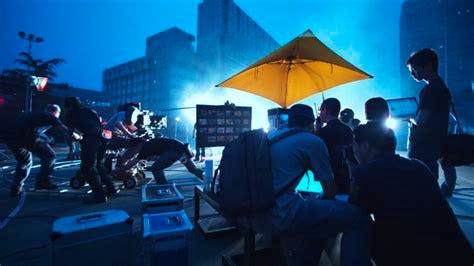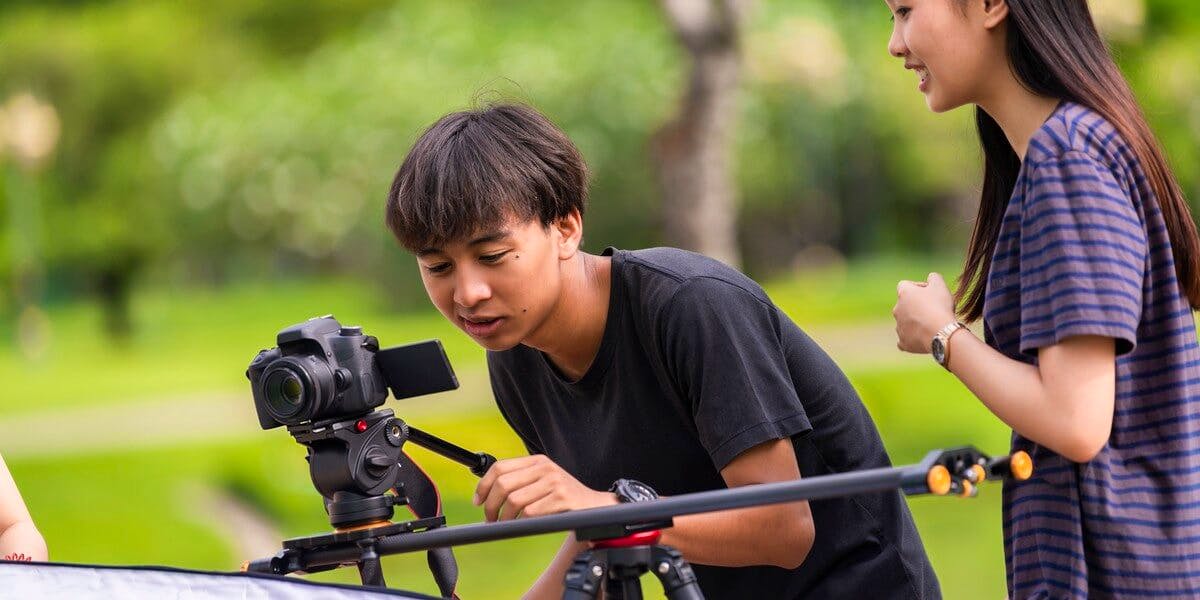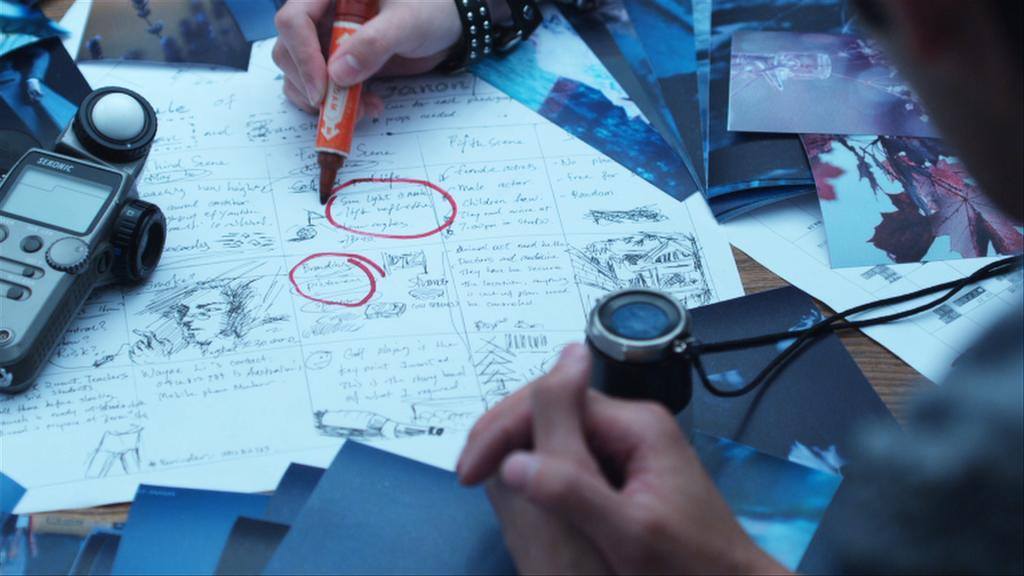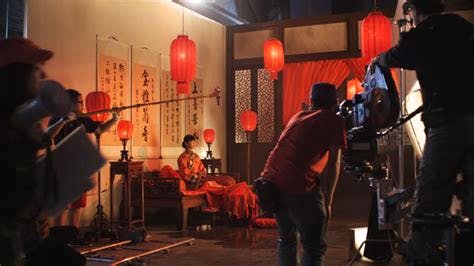 The Bachelor’s in International Film Production Program at Beijing Film Academy (BFA) is a 4 years long program for international students, taught in English. BFA is one of the best film schools in Asia, and can completely transform your filmmaking future!
The Bachelor’s in International Film Production Program at Beijing Film Academy (BFA) is a 4 years long program for international students, taught in English. BFA is one of the best film schools in Asia, and can completely transform your filmmaking future!
Courses in the program have been divided into four categories: Production, Technique, Historical and Theoretical classes. At least 50% of all courses will be taught in the Production aspect, which gives our students a hands-on approach to film making.
Scroll down and read the entire Bachelor’s in International Film Production Program at Beijing Film Academy curriculum!
Deadline: May 10, 2024
Year 1: Freshman Year
First Semester
Visual Narrative 1 – Introductory course to gain an understanding of how to express ideas and emotions using film language vs. literary language. Also, learn the fundamentals of how to use film equipment and how a film crew works. Production course.
Camera technique basics – Technique course, learning the technical elements of the camera such as aperture, lens, exposure, depth of field, and methods like a time lapse. Supports Photography 1 class.
Visual Art History – Theoretical class to understand the development of visual expression in the history of art. Also, explore different aspects of fine art forms like architecture, painting, sculpture. Supports Photography 1 class.
Post-production of Photography – Technique course to gain a basic understanding of how to use post-production software like Photoshop. Learn techniques like color correction, how to refine the image and add special effects to a picture. Supports Photography 1 class.
Photography 1 – Production course learning the skills and language of how to take a professional photograph.
Chinese Basics – Learn the basics of the Chinese language such as Pinyin to help the students learn words and expressions for everyday use.
Society Study – Students broaden their vision through community and volunteer work.
Second Semester
Visual Narrative 2 – Introductory course to synthesize the ideas and emotions in order to gain a deeper understanding of how to use film language. Learn the inner details of film equipment. Production course.
Photography 2 – Production course to let students create high-quality professional photos that will be used for a photo exhibition as the final project. The exhibition will be a part of the academy award “Cinerent Awards” which show to the practitioners in the film industry.
Editing – Technique course to gain a clear understanding of the fundamental concepts of editing and the different theories of how to assemble a film. Learning the basics of how to use Final Cut Pro and Adobe Premiere.
Cultural Comparison – Theoretical course to compare the similarities and differences of Chinese and Western cultures and customs.
Basic Cinematography – Technique course to learn how to shoot with a cinecamera.
Chinese Basics – Learn the basics of the Chinese language such as Pinyin to help the students learn words and expressions for everyday use.

Year 2: Sophomore Year
First Semester
Lighting Basics – Technique course to let students know how to use fundamental lighting equipment to create basic set-ups in order to learn the different characteristics of light like shadow and texture and how to manipulate and control them.
Film History –Theoretical course to gain a broad understanding of the different periods, genres, and major directors in film history.
Basic Screenwriting – Production course to let students learn the difference between telling a story through showing vs. telling. Also, they will learn the basics of script format, structure, character, and dialogue.
Film Sound – Production course to learn how to get good sound quality and the basic skills of sound recording, editing, and mixing. This class supports documentary class.
Documentary Film Production – Production course to learn how to research society and humanity. Learn techniques to interview people and shoot a short documentary.
Chinese Culture and Language 1 – Learn the Chinese language in different situations of Chinese culture, practice language in order to get familiar with Chinese people, and work with local people.
Society Study – Students broaden their vision through community and volunteer work.
 Second Semester
Second Semester
Experimental Image – Production course to learn how to combine technical elements of Cinematography with the concept of how to manipulate the form, color, and shape of the image.
Basic Visual Effect – Production course that introduces the fundamentals of how to think digitally and to gain the necessary computer skills to create computer graphics. Learn how to shoot and finish the production of greenscreen, stabilize the image, and compose images.
Producing – Theoretical course to help students understand budgeting, scheduling, how to obtain financing and distribution.
Acting –Production course to learn the fundamental skills of acting, how actors prepare, and the mental process of developing a character. In the end, students will act in a play of 15 or 20 minutes.
Film Genre – Theoretical course to gain a further understanding of the different periods, genres, and major directors in film history. Professor will let the students do some research or practice in different types of film.
Chinese Culture and Language 2 – Learn the Chinese language in different situations of Chinese culture, practice language in order to get familiar with Chinese people, and work with local people.

Year 3: Junior Year
After experiencing the different facets of film-making, Film Production Program students will now have a better idea of what they want to do and now they can choose to major in one of the following concentrations: Directing, Cinematography, or Visual Effects.
In Junior Year, BFA offers the most professional filmmaking courses that follow the trends and standards of the global film industry. Professors will give different requirements depending on the major that the students selected.
First Semester
Advanced Screenwriting – Production course, a more in-depth look into feature film screenwriting. Also, a professional script of 8-12 minutes of length will be shot in Term 6 for the Directing course. At last, through personal 1 on 1 meetings students, will prepare a professional script that will be used for their thesis film.
Advance Technique of Cinematography – Technique course to learn how to manage with the professional cinecamera such as ARRI or Red, and more practical knowledge of operating cinecamera. This course supports Advanced Cinematography.
 Advanced Cinematography –Production course introducing more skills and methods of Cinematography and becoming familiar with advanced lighting and camera equipment. Learn how to make an equipment list. Students work together to shoot on set in different scenes and build the light effects which fit the atmosphere. Students will fully understand and comprehend the skills needed to be a professional Cinematographer. This course support Directing in Semester 6.
Advanced Cinematography –Production course introducing more skills and methods of Cinematography and becoming familiar with advanced lighting and camera equipment. Learn how to make an equipment list. Students work together to shoot on set in different scenes and build the light effects which fit the atmosphere. Students will fully understand and comprehend the skills needed to be a professional Cinematographer. This course support Directing in Semester 6.
Digital Image technique –Technique course to let students know the importing and naming digital files, how to use photo software, how to compress and decompress video in order to prepare for field editing and post-production
Second Semester
Directing – Production course to let students will develop their directing skills such as how to work together with actors, how to block a scene, how to design mise-en-scene, and improve their storytelling ability. Learn the role of the director in professional productions and the strategies of how to work with a producer, distributor, and crew. Also know about how to make a budget, developing ways to manage time on and controlling difficulties on set. Learn to set up a crew and how to efficiently manage people. Shoot the short film based on the script that students made in Semester 5.
Advanced CGI training – Learn the in-depth details of color correction, compositing, and computer graphics.
Thesis Film making – In order to graduate students must create a thesis film that will exemplify all of what they have learned in the previous 3 years. From this course, the professor will give advice on preparing the film production and give the students the timeline for the final year.

Year 4: Senior Year
Senior year is for Film Production Program students to complete the planning, filming, and editing of their thesis film. Students will select a professor as their advisor for this project as well as access opportunities to take part in student exchanges (some destinations include the Netherlands and Korea).
The senior year thesis project is also a way for students to petition for financial support from BFA, allowing them greater resources to complete filming. Even if students aren’t selected for extra funds, the materials and existing resources of the department are available to all students filming their thesis films.
Apply for the Film Production Program at Beijing Film Academy
Deadline: May 10, 2024
China has become the world’s fastest-growing film market. In 2012, China witnessed a box office of $ 2.7 billion, becoming the world’s second-largest film market after the United States. With an annual output of over 600 feature films, China now has a growing need for filmmaking talents.
We welcome young people from all over the world who love the movie industry and are willing to work in the filmmaking area to join BFA and learn the art and skill of filmmaking together with Chinese students. We hope film talents from different cultural backgrounds can mingle and grow together here in BFA.
Read More: Study at Beijing Film Academy: the Home of Chinese Cinema
Learn more about BFA
Interested to study at Beijing Film Academy? Learn more about the programs and apply to Beijing Film Academy through the links below. Or book a free call with us here.
Loading programs...
- Curriculum of the Film Production Program at Beijing Film Academy - November 3, 2023
- 11 Things Every Ethiopian Student Should Know About Studying in China - June 28, 2022
- CEIBS MBA Interview 31 Sample Questions & Tips - February 23, 2022

